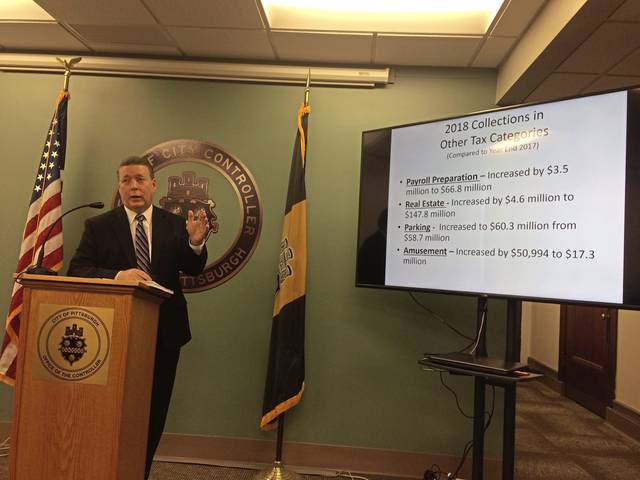Pittsburgh ended 2018 with a $3.3 million general fund surplus despite moving nearly $50 million out of the operating budget for capital projects, affordable housing and employee pensions, Controller Michael Lamb said Wednesday.
Lamb in releasing his Comprehensive Annual Financial Report for 2018 noted that Pittsburgh had a total unassigned fund balance of $114 million — equal to 20 percent of the $568 million operating budget for 2019 — at year’s end. He also noted that Pittsburgh in 2018 was freed from state financial oversight for a first time since 2006 when it was facing bankruptcy.
Pittsburgh in 2018 transferred $26 million to its capital budget, provided the Urban Redevelopment Authority with a $10 million grant for its Housing Opportunity Fund for affordable housing and pumped an additional $13 million in parking tax revenue into employee pension funds, he said.
“In doing all of that we generated a surplus,”Lamb said. “It’s a very strong financial position for the city.”
The only downside was a loss in the invested portion of employee pension funds because of a stock market decline. The funds lost about $20 million, but have since made up the loss with increased returns. At year’s end funds for retired police officers, firefighters and municipal employees totaled around $450 million and have since increased to about $463 million, Lamb said.
Pension funds experienced a marked improvement since 2010 when the city was facing state takeover of the underfunded plans. For a first time in 2018, Lamb said, the city contributed more money to pension funds than it paid out.
“If we can continue to do that and just allow this portfolio to grow, even if we only earn 5 percent over the next 20 years, we’re going to have $1 billion in 17 years,” he said. “That’s the power of compound interest.”
Tax revenues last year increased across the board, including a $1.6 million growth in parking taxes, $3.2 million in earned income taxes, $4.6 million in real estate taxes, $1.5 million in local services taxes, $3.5 million in payroll preparation taxes and $50,994 in amusement taxes.
Lamb said the local service tax — $52 levied on every person working within city limits — was significant because it indicates job growth. The tax has been stagnant for years.
“I think that portends good things for us moving forward,” Lamb said.
Spending on operations and capital projects also increased by about $39 million. Lamb criticized a $40 million bond issue that was used to purchase a building along the Boulevard of the Allies to house city offices, including Permits Licenses and Inspections. The building will also house the Urban Redevelopment Authority and the Housing Authority of the City of Pittsburgh.
The three agencies are splitting the cost.
“I call it the Permit Palace,” Lamb said. “I’m still bothered by that purchase, that we spent that much money to house our employees.”








